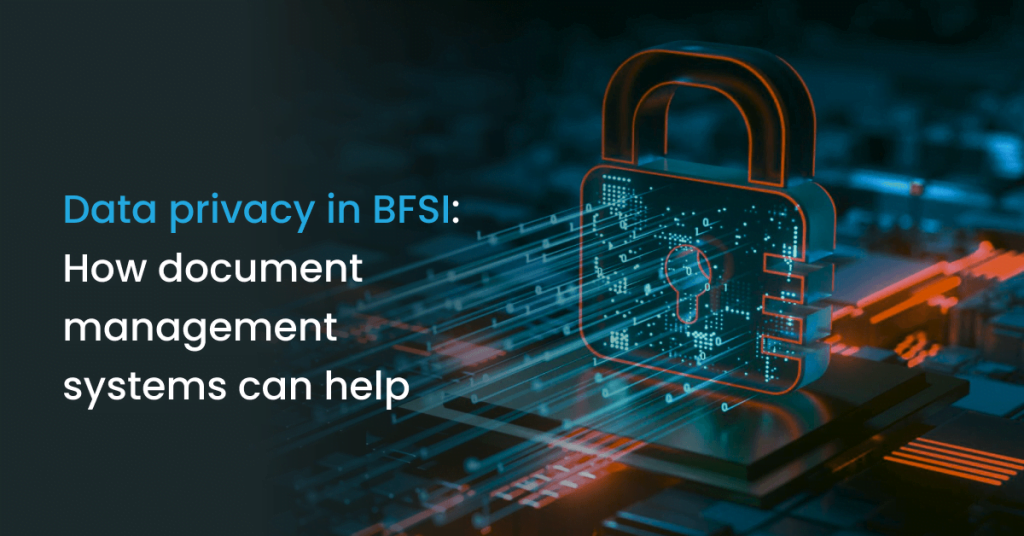
Introduction
The advancement of automation in financial services has been a pivotal shift in streamlining operations, enhancing customer experience, fortifying security and holistically changing how financial institutions operate. In this era marked by unprecedented security breaches and the increasing complexities of regulatory requirements, can financial institutions accelerate privacy compliance and security postures with the help of technology? According to the CPA Practice Advisor, institutions that implement a Document Management System (DMS) can save on overhead costs of up to 30% to 40%, leading to enhanced productivity and efficiency, all while assisting in privacy compliance and bolstering security measures.
Eager to know more about how DMS can assist your financial operations, especially in regulatory compliance and security? Read along to explore the transformative capabilities of DMS in the BFSI sector.

The Data Privacy Challenges in BFSI
Data used for daily operations in BFSI is highly sensitive and critical in nature, requiring stringent protection and privacy compliance to ensure security and integrity. The imperative of data privacy in BFSI has a multitude of applications, ranging from securing customer information, adhering to regulatory standards, and fostering trust and reliability in overall financial transactions. Let’s quickly glance at some of the prevalent types of data used in the BFSI sector.
Personal Identification Information (PII):
Data that can be used to uniquely identify or locate an individual, such as their name, address, social security number, etc., encompasses PII.
Financial Records:
Data such as account numbers, transaction history, investment portfolio, and all other comprehensive details about a company or an individual’s financial transactions also pertain to sensitive financial information that needs privacy protection.
Income Details:
Data about an individual’s income, like salary, bonus, and employment status, are also subject to privacy confidentiality obligations, requiring financial institutions to protect it with utmost security.
Health Data:
Insurance agencies often record individuals’ health records that are used for policy undertaking and claims management, which require rigorous privacy adherence and protection from misuse.
The operational structure of financial institutions demands robust security standards to protect the aforementioned data while maintaining customer integrity and ensuring strict privacy compliance. Therefore, secure document handling in BFSI is a critical component that can’t be fiddled with.
The finance sector is strictly monitored and regulated for its financial protocols, management practices and legal compliances, particularly in the realm of BFSI data privacy. The regulatory landscape of BFSI is multifaceted, with financial institutions adhering to a variety of regulations. Key regulations include:
- General Data Protection Regulation (GDPR)
- California Consumer Privacy Act (CCPA)
- Digital Personal Data Protection Act (DPDPA)
- Health Insurance Portability and Accountability Act (HIPAA)
Navigating this complex regulatory environment requires financial institutions to be vigilant and proactive in their approach to compliance. Often requiring effective information handling and protection measures in the wave of evolving regulatory requirements.
The Intricate Threat Challenges in the BFSI Landscape:
The BFSI sector faces severe financial implications due to cyberattacks, with finance firms losing approximately $5.9 million per data breach. This dynamic and sophisticated threat landscape has opened the door for a variety of threats that compromise data privacy and security. Some of the prevalent attacks in the BFSI sector include Phishing attacks, Ransomware, data breaches, insider threats, etc.
To address all these BFSI data privacy challenges, financial institutions require a comprehensive approach to information processing. Let’s discern document management systems and their role in secure document handling.
Understanding Document Management Systems (DMS):
The core capability of a document management system, or DMS, is its ability to store, manage and track electronic documents in a single repository. By incorporating document and content capture, workflow, version control, information repository and retrieval functionalities, DMS facilitates efficient organization, retrieval, and secure document handling throughout the information life cycle.
Here’s a quick rundown of its applications in BFSI
- Centralized Document Repository: Financial institutions, as iterated before, have an array of documents that need to be accessed regularly. Acquiring it from various places often hinders operational efficiency and increases time spent searching for documents. Now, imagine having all your documents in one single place that is secure and accessible from anywhere. This is what DMS brings to the table to simplify and streamline BFSI document management. It efficiently solves the challenge of scattered document storage, ensuring quick access and robust security amongst stakeholders.
- Selective Access and Security: While handling sensitive information, we need impenetrable security mechanisms that can protect confidential data from unauthorized access or breach. DMS ensures the documents are shielded by selectively granted access in BFSI operations, adding an additional layer of security that mitigates the risk of monumental repercussions.
With added security features like:
– Robust security storage
– Access controls
– Encryption
– Backup and recovery
DMS solidifies security measures, safeguarding sensitive data against potential data breaches while bolstering confidence in the security of BFSI operations. - Tracking Changes with Ease: In the process of tight deadlines or important operations, multiple edits, updates and reviews can cause hassles for staff members as they struggle to track the changes and revisions. However, with the implementation of DMS, every edit, update or review is logged, making it easy to track the document journey. This feature of DMS incorporates vital transparency that is imperative for compliance and audit trails.
Transformation of BFSI Operations with DMS:
Let’s briefly explore the tailored benefits that DMS offers to BFSI operations:
Benefit | Imapct on BFSI Operations |
|---|---|
Streamlined compliance | DMS ensures financial institutions meet regulatory demands by automating record keeping, audit trails, and compliance reporting, which is crucial for adhering to laws like GDPR, HIPPA, DPDPA, and CCPA. |
Advanced data encryption and secure document sharing | DMS incorporates sophisticated encryption protocols for documents at reset and transit, changing sensitive information into unreadable formats for unauthorised users. Additionally, DMS allows for the safe exchange of information between authorized parties, reducing risks related to data interception, access and breaches. |
Enhanced document security | By offering advanced security features like role-based access control and encryption, DMS protects sensitive financial and personal data against impending attacks and breaches. |
Operational efficiency | DMS can automate document-centric operations like account opening, loan processing, claim management, etc., reducing turnaround time and improving operational agility. |
Strategic risk mitigation | Facilitates better risk assessment and mitigation by providing instant access to financial documents and histories, enabling informed decision-making. |
Customer experience | Agility and accuracy in document processes can enhance the customer experience, leading to higher satisfaction and retention rates in the competitive landscape of BFSI. |
Cost and space-effective | DMS can effectively eliminate the need for physical document storage, decreasing space-related costs. Additionally, this also leads to paperless operations, reducing printing and other related expenses, which aligns with sustainable goals and supports eco-friendly practices. |
Use Case of DMS in BFSI
Consider loan processing in BFSI; this procedure involves the handling of sensitive data, including personal identification details, credit scores, income statements, etc. Protecting data privacy and security throughout the loan process becomes paramount for the customer experience and regulatory compliance.
Challenge:
The legacy workflow encompasses multiple steps that expose these data to risks like unauthorized access, misplacement of documents, data leakage, etc. This challenge poses a serious discussion about rethinking document handling.
Solution:
By implementing DMS. Financial institutions can facilitate:
- Digital submission and storage through which documents are collected, monitored and controlled in a single repository.
- Automated workflows to route documents to various departments to expedite the process.
- Access control and authentication to restrict role and responsibility-based access, ensuring data privacy.
- Audit trails that record who and when documents were modified, aiding in regulatory compliance.
- Encryption and complete protection to secure sensitive data during transmission and storage.
Outcome:
This implementation of DMS streamlines the loan process, enhances the privacy and security of customer data, and safeguards sensitive information.
Best Practices for Implementing DMS in BFSI
To get the best out of your DMS implementation for efficiency, compliance and data security, consider incorporating the following practices:
- Choose the Right DMS: The selection of the right DMS is crucial to meet the required needs for BFSI data privacy and document management. Deploying DMS with advanced security and compliance capabilities will effectively assist in information protection and regulatory adherence. Also, selecting DMS based on scalability and user-friendliness helps in optimal performance and easy adoption for seamless integration into existing workflows.
- Integration: The DMS integration should be compatible with existing systems and additional software, creating a cohesive enterprise content management system. Therefore, by conducting a thorough assessment of IT infrastructure and effectively integrating it into the legacy systems, DMS can deliver transformative results, especially in streamlining data handling and enhancing operational efficiency.
- Make Automation a Priority: With the rise of automation, using a DMS with advanced automation capabilities can yield significant benefits, including the reduction of manual handling, speeding up service delivery and minimizing errors. Therefore, prioritize automating operations for all document-related processes.
- Training and Awareness: Building competence in the usage of DMS among staff is one of the most critical aspects of implementation. Therefore, educate the staff on functionalities, security concerns and regulatory adherence to make the most of DMS adoption.
Take the Next Step – Select the Right DMS with SquareOne Technologies:
SquareOne Technologies’ seasoned expertise in enterprise information management enables them to provide optimal deployment of document management systems for your BFSI operations. With a record of assisting financial institutions in document management, SquareOne aids in achieving your goals for operational efficiency and innovation. For effective implementation, integration, and maintenance of DMS, SquareOne is the ideal partner for your digital evolution.
Conclusion
Document management systems can assist in BFSI Data Privacy with their advanced automated security and privacy compliance features. By integrating a robust DMS, financial institutions can protect information, streamline operations, and adhere to regulatory requirements. Connect with experts at SquareOne today and transform your document management strategies. Leverage the latest technological solutions with SquareOne for a transformative future.


















